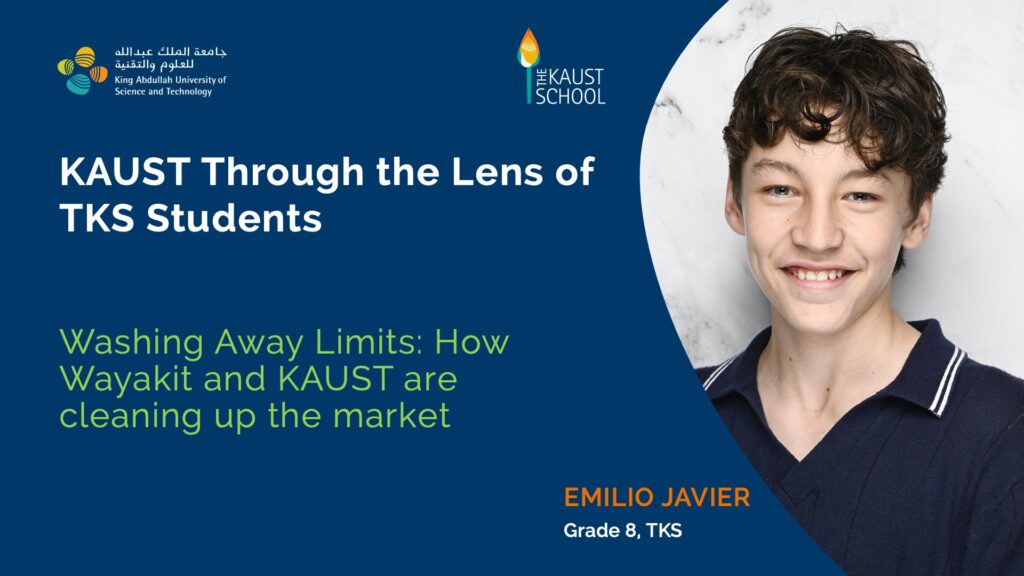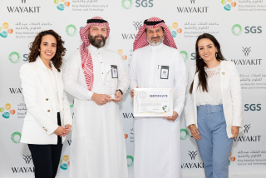
Over the past few weeks, Grade 8 students at The KAUST School have been diving into the world of journalism. They’ve explored different styles of writing and even set up their own media agencies to report on stories happening all around the KAUST community. From school sports and campus gardeners to cutting-edge science, coral restoration, and local start-ups — their coverage has been wide-ranging and full of energy.
Through interviews and hands-on research, these young journalists have shown real curiosity, creativity, and professionalism. As part of a fun competition, eight top articles have been chosen by TKS to appear in The LENS over the next month as part of the ‘KAUST through the lens of TKS students’. As a note, these articles reflect the students’ creative work as part of a school project and have been selected based on their creative writing skills. We hope you’ll enjoy reading their work and help us celebrate what they’ve accomplished!
Washing Away Limits: How Wayakit and KAUST are cleaning up the market
– By Emilio Javier, Grade 8, The KAUST School

Can you imagine working away from home, making just enough to scrape by, to provide for a future that feels like a marathon’s distance away? Now, picture yourself isolated, working 12-hour shifts, and having little to no contact with your loved ones. This is the harsh reality for many people worldwide, and it could be anyone from a fast-food employee, a school janitor, or even someone you may know. It might even be the person who helps clean your home. While not everyone in these positions faces the same conditions, these everyday cleaning products, so common in homes around the world, silently harm those who use them most. Amid this quiet danger, one brilliant mind saw the potential to develop a perfect business opportunity to create sustainable, bio-friendly cleaning products. This is the story of the Co-founder of Wayakit, Luisa Javier.
Luisa lived this experience thanks to her desire to study abroad in France despite being financially restricted. Because of this, she took a part-time job in the US as a kitchen staff member. During her time there, she says, “I saw that most of the cleaning products there were super toxic, even from the big, big companies. And they are not doing the job. My hands were burning… it was frustrating, you know?” This inspired her to create Sinaqua, her first company, founded in Mexico, and later on Wayakit.
She founded Wayakit with her Co-Founder Sandra Medina, a Colombian P.h.D student at KAUST. Luisa was also pursuing her Ph.D. at KAUST, where, after discovering they had similar expertise, they decided to join together to create Wayakit. “We combined both of our expertise,” Luisa said, “and that helped us dig into the technical background that Wayakit is actually based on.” With Sandra’s expertise in membrane cleaning and surfactants, they worked together harmoniously to create the product we know today. They ended up officially founding the company in 2020.
Creating the product is only one part of the story; the other is selling it. This is where KAUST’s entrepreneurial programs come into play. KAUST is renowned for housing outstanding entrepreneurship programs accessible to those with the ideas and ambition to bring them to life. And in this case, they did match the opportunities available, winning TAQADAM Startup Accelerator 2018, a competition KAUST hosts for upcoming startups. As a result of this tremendous success, they received funding from KAUST totaling 375,000 SAR, which was a massive help towards developing the startup. But this was no coincidence, as KAUST has a notorious reputation for nurturing successful businesses. Dr. Ian Campbell, Vice President of the National Transformation Institute, highlights, “We, first of all, help them to become entrepreneurs… and then we run something called the KAUST Investment Fund that acts as a seed funder to allow the companies to get the first tranche of money to help them to build a business.” Luisa Javier said this was especially helpful: “We had the help of the TAQADM Accelerator program… it was a great acceleration for us to start testing our product and find the market segment we were going to address.”
They eventually did find their market segment along with their admirable vision and values. They identified what the company stands for: representing women in Saudi Arabia and developing sustainable yet efficient cleaning products. After trial and error, they eventually found a home in the travel/airline industry. However, Wayakit is still looking to broaden its horizons with new segments such as Hajj and Umrah. This footprint into the Hajj and Umrah proves the impact that Wayakit is having on the Kingdom. As Luisa Javier says, “In Saudi, 97% of the aircraft are being cleaned with our products… more than 2.2 million passengers during Hajj and Umrah were not exposed to toxic components thanks to the use of our products.”Not only did she find her market, but she also embraced the values initially set when representing women in the Saudi market. She says, “Seventy percent of our workforce is female. So we are promoting the participation of Saudi females and females in general in the company’s high-level executive levels.”
She also looks to expand into the future as Saudi Arabia pursues Vision 2030 at a staggering pace, an initiative that perfectly aligns with Wayakit’s direction. Luisa emphasizes, “Wayakit is aligning in different verticals from Vision 2030. So, we are doing local manufacturing, all the local content, not only manufacturing. The R&D is developed here.”
With all this success comes setbacks, and when asked, Luisa Javier mentioned, “The ecosystem has been evolving with us, meaning that there is not someone that we can mimic before or, um, they have learned with us.” This is interesting because Ian Campbell notes, “The innovation ecosystem in Saudi Arabia is young, so; therefore, it only has a limited amount of money and expertise.” These two statements align because they acknowledge that the ecosystem and Wayakit are growing together to help startups in the future, which frames Wayakit as the pioneer of entrepreneurship at KAUST. This certainly highlights the journey and importance of Wayakit, as it still continues to serve as one of the prime examples for upcoming businesses in KAUST.
In a place like KAUST, where innovation isn’t just encouraged, it is expected. Wayakit’s journey proves that ideas from minds like Luisa’s, needing only kindling and guidance, can ignite a stronger, more refined program. One that’s now shaped by her own story. All of this shows that Wayakit has cleaned up more than just surfaces; they’ve cleared and cleaned the path for bold ideas to become businesses. Their journey exemplifies how KAUST is nurturing startups and actively creating an ecosystem where innovation thrives, and future solutions take root.

